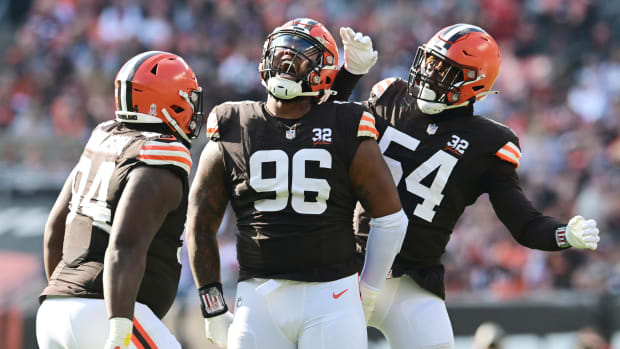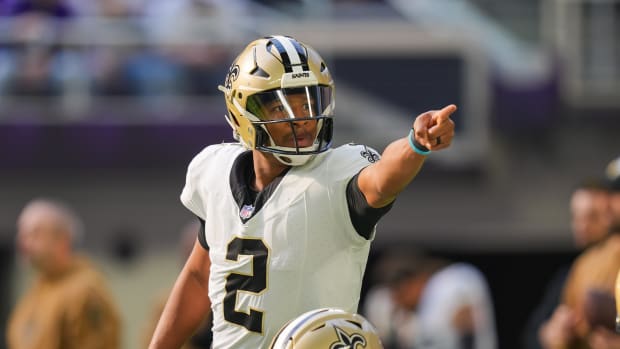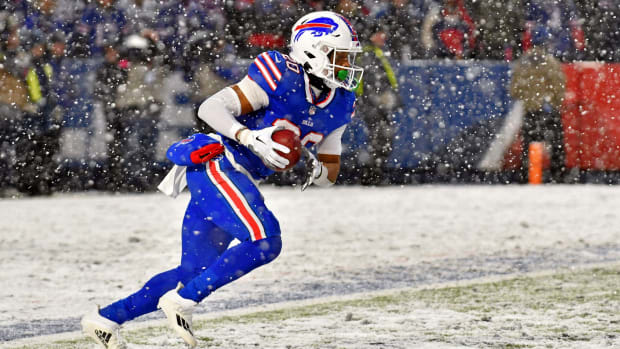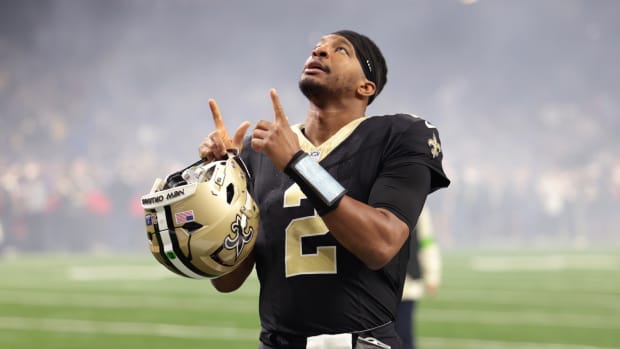J.C. Tretter May Best Roger Goodell In Public, But It May Not Matter In Negotiations
NFLPA President and Cleveland Browns center J.C. Tretter may be able to decisively defeat NFL commissioner Roger Goodell in public, but it remains to be seen if that will matter when it comes to negotiations regarding COVID-19 safety protocols for training camp and games this season.
The dynamic at play is reminiscent of the play and movie, A Few Good Men. After locating a key witness, the defense of Lt. Daniel Kaffee and Lt. Commander Joann Galloway feel empowered to bargain with the prosecution, Captain Jack Ross. Ross significantly improves the plea bargain offer, but refuses to drop the charges altogether.
When threatened with the prospect of going to court, Captain Ross puts his foot down, saying "...even though he's got me by the balls out here, Dan knows that in a courtroom, he loses this case. Danny's an awfully talented lawyer, and he's not about to send his clients go to jail for life when he knows they could be home in six months."
For as effective of an advocate at Tretter is outside the proverbial court room, it doesn't seem like it will matter as much as it should when it's a binding negotiation. That has nothing to do with Tretter's ability or lack thereof, but a perpetually impotent players union limits what Tretter can accomplish.
Between a revolving door of union members because of how short careers are and non-guaranteed contracts, Tretter can be the best negotiator possible and it may not mean much since players are often unwilling to cause a work stoppage. For all the concerns about COVID-19, players are preparing to play and are unlikely to give up a chance to make as much money from the NFL as they can. Many aren't just providing for themselves, but are attempting to provide a better economic reality for entire families.
Tom Brady and Russell Wilson, two of the best quarterbacks in the league, have led workouts with teammates after the union advised them not to due to rising infection rates. Brady doesn't need the money, but won't support a work stoppage, because he wants to win the Super Bowl now and this might be his last chance to do it.
If two of the top quarterbacks are out there leading practices, it only adds pressure for everyone else to follow suit to avoid being at a competitive disadvantage. Other teams may try to avoid having anything end up on social media while doing it, but it's delusional to believe other teams won't do exactly what Brady and Russell did.
The NFL is not the NBA or MLB. Their unions have nowhere near the power and their players are programmed to play. Load management has become a fixture in the NBA and there's more consideration for it in baseball than ever before. Legendary USC head coach John McKay addressed football's thought process about load management when he was asked about O.J. Simpson carrying the ball 47 times in a game, noting, "the ball doesn't weigh that much."
The threat of Chronic Traumatic Encephalopathy barely made a dent in the number of players who pursue NFL careers even when worry was at its highest. A virus that most believe they can fight off easily due to being at the peak of their physical powers, assuming they show symptoms at all, is going to be perceived more of a potential setback than something that might permanently impact their life or kill them.
Players may quarantine themselves for the season from immediate family to limit their risk of infection, not unlike working on an oil rig, fishing boat or serving in the military for several months at a time. For the money, that might be a worthwhile trade off for them.
That's why it's so easy for Roger Goodell to speak about the players like they have so little bargaining power, because he knows from experience. Tretter can land body blows and score points in the court of public opinion, but the substantive impact is small.
For example, Tretter gave a terrific answer to the notion that playing in the NFL is a privilege rather than a right.
“It’s neither. It’s your job. It is a highly sought-after job and a childhood dream, but it is a job, nonetheless.”
Tretter also took issue with the notion that NFL player demands should be lowered, because their job isn't essential, compared to those of teachers and medical personnel, pointing out it's a false choice while also encouraging all workers to try to use any leverage they have for a better deal.
“I hope every worker can maximize their talents and use their leverage to get paid more — especially essential workers. To be clear, though, there is no correlation between a football player’s paycheck and a nurse’s paycheck. As employees of NFL teams, we put a product on the field that brings in billions of dollars. The NFLPA collectively bargained for a percentage of that revenue. When the NFL and NFLPA split up billions of dollars, that leaves players in a position to make life-changing money. If less money was allocated to players, NFL owners would not turn around and gift the extra revenue to pay teachers, nurses, or other workers more money.”
The reality is that while these are excellent points, they aren't likely to be persuasive to the public, simply because they aren't paying attention. People are concerned about COVID-19 and its impact on their lives. They aren't invested in a potential disagreement over safety protocols. Overwhelmingly, they just want to be able to watch football and aren't terribly worried how they get it.
Since being elected in March, Tretter has been more than up to the task of being the head of the union. For all the intelligence and tact he has advocating for the players, coming off as reasonable rather than argumentative, if an overwhelming number of union members are pressuring him to sign off on a deal so they can play, that's what will happen.
There has been little if any indication that players are willing to consider a strong opposition to the league, save for some of the union team reps. Even when players do raise concerns, it's often followed up by reinforcing their desire to play. Some of that might be a conscious effort to avoid being painted with the same entitled brush as Major League Baseball players, but it's also undoubtedly rooted in reality.
The NFL's ability to lose superstars and roll on, all while gaining popularity, is what makes it such a powerful and valuable league. It's also a framework that presents a huge challenge for Tretter to navigate in order to negotiate meaningful change on behalf of the players union.




